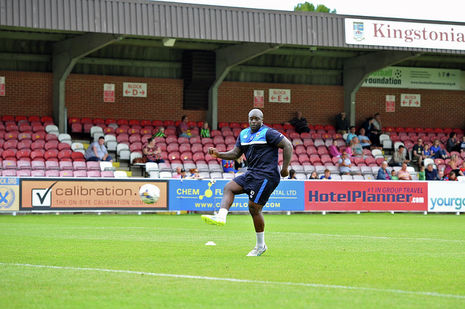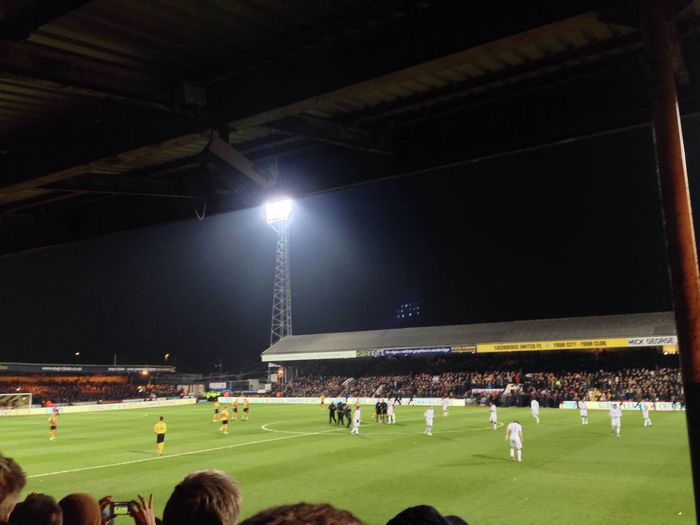Coronavirus and the impending crisis of community football
George Worrall looks at the impact of coronavirus on the finances, fans, and future of lower league clubs, spotlighting AFC Wimbledon

In an environment already dominated by uncertainty, coronavirus is creating unprecedented challenges for clubs lower down the English footballing pyramid. For community-orientated clubs such as AFC Wimbledon, this uncertainty extends far beyond the confines of the football field.
Picture the scene. It’s late February and AFC Wimbledon (known as “the Dons”) are precariously perched above the League 1 relegation zone with 11 games left to play. With the world focused on Liverpool’s seemingly inevitable Premier League title, Dons fans are facing an increasingly likely prospect of matches against Barrow or Salford in League 2 next season.
Off the pitch, the club has also been trying for years to open a new chapter in its short existence, attempting to complete a move into a brand new 9,000-seater stadium. However, with construction already underway, they are facing an £11 million funding shortfall. Uncertainty, as ever, is rife.
The history of AFC Wimbledon is a unique one. Founded in 2002 after Wimbledon FC, famous for their 1988 FA Cup victory and “the Crazy Gang”, were moved by their owners from Plough Lane in Wimbledon to Milton Keynes – losing their identity and being renamed MK Dons in the process. Unwilling to accept the loss of their beloved club, fans created a new club called AFC Wimbledon who entered into the 9th tier of English football.
“AFC Wimbledon is just one of many clubs facing a future that is far murkier than it was just a few months ago.”
The phoenix club continued the spirit of Wimbledon FC but with two key differences: they would be owned by the fans, and would be playing 5 miles away in Kingston rather than Wimbledon, owing to this being the only viable site. Five promotions followed with them reaching the Football League in 2012 and the heady heights of League 1 four years later, where they remain to this day.
The new stadium, which is being built on Plough Lane, is remarkably just a few hundred yards away from where Wimbledon FC used to play. With AFC Wimbledon currently in a 4,850-capacity stadium that is not only outside Wimbledon, but smaller than many non-league grounds, a new stadium has always been key to the club’s future success.
Planning permission was approved in 2015, but following delays initially instigated by the then Mayor of London Boris Johnson, combined with unfavourable economic conditions in football, cost overruns left the club £11 million short of the money required to finish the ground. Faced with the potential of having an unfinished stadium, at the end of 2019 external investment and a loss of fan ownership appeared to be the only route out of the funding crisis.
Yet, once again, the determination of the fanbase to keep the club grounded in the community resulted in the creation of the Plough Lane Bond to help finance the shortfall. This has already raised a remarkable £5.4 million, and a bank loan is currently being sought to cover the remaining costs.
Yet turmoil is not uncommon at this level of the game, with many clubs finding themselves in far worse financial circumstances. Bolton Wanderers and the recently dissolved Bury FC both started the 2019-20 League 1 season on minus twelve points as a penalty for their financial mismanagement, and Coventry City even faced expulsion from the league over the prospect of having no ground to play at after their eviction from the Ricoh Arena.
“...the coronavirus crisis has brought some much-needed reminders of just how important these clubs are...”
Now, think of the state of the game today where even the devastating news of Bury’s demise seems insignificant compared to what the Football League is facing. Coronavirus has come to define day-to-day life and football is grappling with the consequences.
With the UK economy facing possibly the worst contraction in several centuries, football clubs will understandably not be the priority for government bailouts. Clubs may see reductions in future match-day revenue as consumers begin to feel financial pressure. Rick Parry, the chairman of the English Football League, recently said that Football League clubs are facing a £200 million funding shortfall by September. For teams like AFC Wimbledon, unable to rely on external investment from outside the fanbase, the consequences of this could be serious.
Wimbledon fans can take comfort from the words of their chief executive, Joe Palmer, who stated in March that the club “would survive financially” if the season is scrapped, something which seems an increasingly likely prospect given the decisions of the National League, Dutch Eredivisie and French Ligue 1 to end their seasons early.
However, it seems the financial uncertainty will likely delay the club’s attempts to return to Plough Lane: individuals may have reservations individuals about purchasing bonds in the club given the economic outlook, and there will be uncertainty in securing the bank loan to cover the remaining costs.
Palmer’s latest update on this was that the club was in “advanced discussions with a lender and will provide a separate update in the future”. Understandably, the longer this unpredictability remains the more the unease will increase amongst fans.
However, financial precariousness aside, the coronavirus crisis has brought some much-needed reminders of just how important these clubs are to the communities which they serve. The Dons Local Action Group, set up by AFC Wimbledon fans, is working with a team of volunteers to provide food packages to vulnerable individuals throughout the community through collections outside local supermarkets. Driven by volunteers, services like these have become a lifeline for many in the local community, and show these football clubs to be more than just sources of entertainment on a Saturday afternoon.
Coronavirus has undoubtedly created unprecedented uncertainty, and many football clubs are already feeling the consequences. AFC Wimbledon is just one of many clubs who will be facing a future that is far murkier than it was just a few months ago. It appears the months ahead will be a challenge for all of football and for wider society, and the long-term consequences of this crisis remain unclear.
However, one thing is certain – coronavirus has shown us the importance of community, and perhaps why we need a community focus in football more than ever before.
 Comment / College rivalry should not become college snobbery30 January 2026
Comment / College rivalry should not become college snobbery30 January 2026 News / Downing Bar dodges college takeover31 January 2026
News / Downing Bar dodges college takeover31 January 2026 News / Cambridge for Palestine hosts sit-in at Sidgwick demanding divestment31 January 2026
News / Cambridge for Palestine hosts sit-in at Sidgwick demanding divestment31 January 2026 Science / Meet the Cambridge physicist who advocates for the humanities30 January 2026
Science / Meet the Cambridge physicist who advocates for the humanities30 January 2026 Features / Are you more yourself at Cambridge or away from it? 27 January 2026
Features / Are you more yourself at Cambridge or away from it? 27 January 2026










